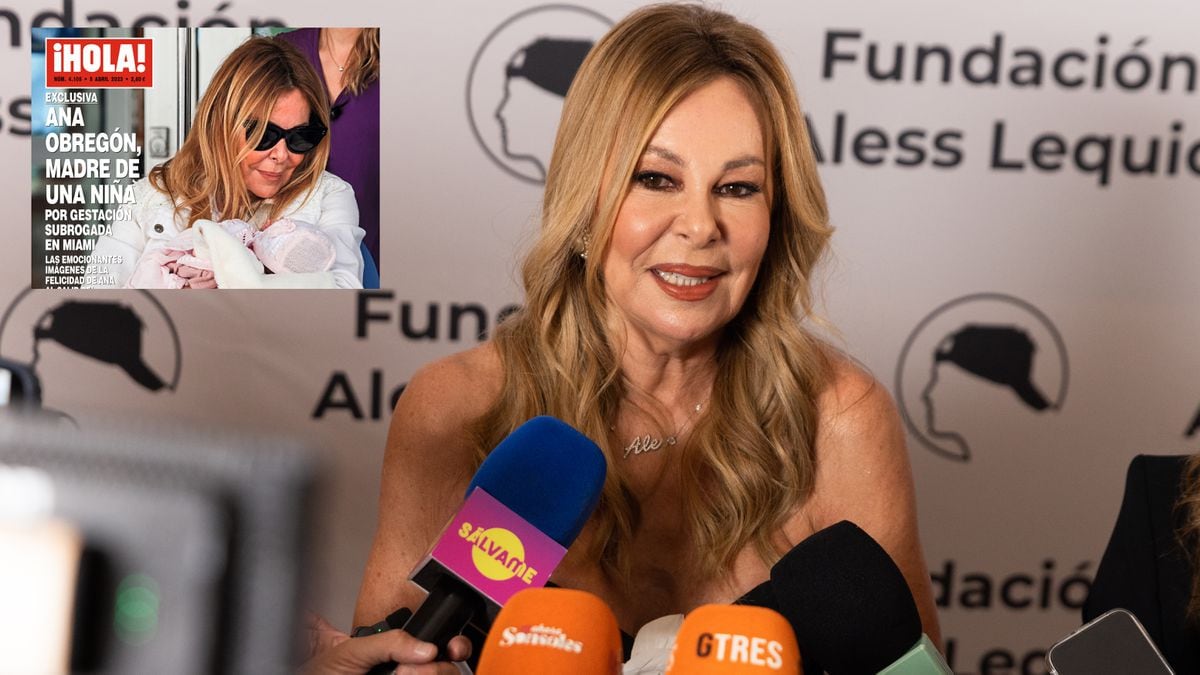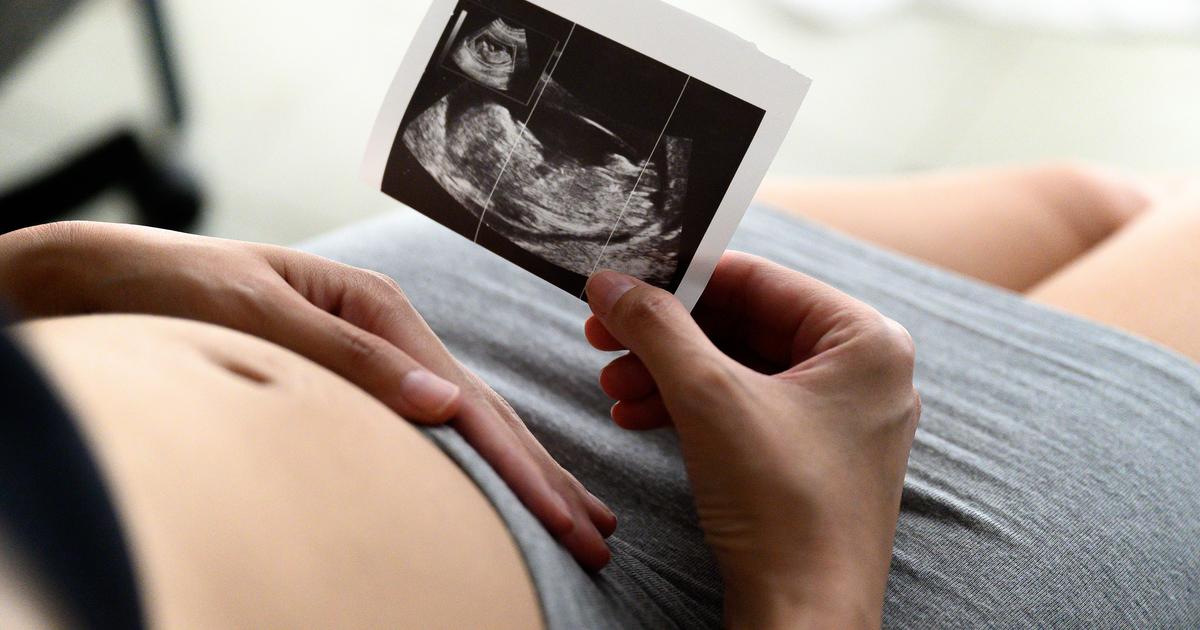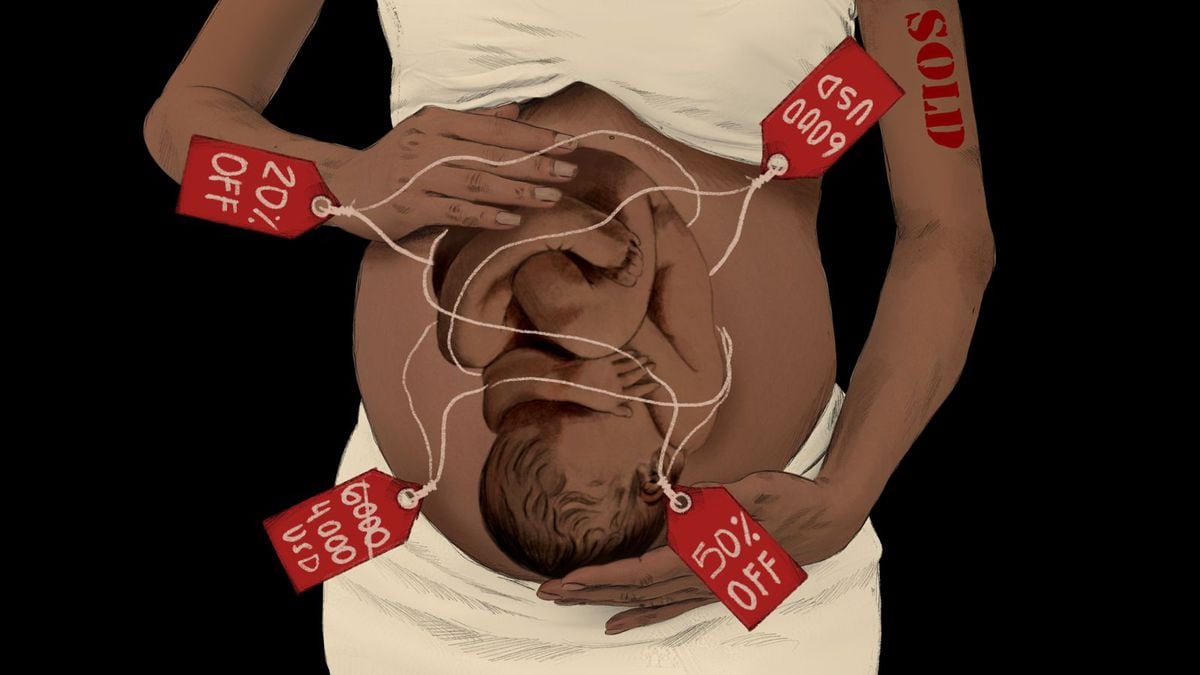For decades, the actress and television presenter Ana Obregón has starred in the cover photos of gossip magazines.
She has done it in a bikini and in a party dress, showing her house, or posing with her family and the different partners she has had.
She also documented the pain she suffered when burying her son Aless, who was sick with cancer, three years ago.
But the image of Obregón that has created the most debate and controversy, and that has jumped into politics, is that of this Tuesday in
Hello!
: hers with a baby in her arms in a wheelchair pushed by a nurse from a hospital in Miami, in the United States.
On her right wrist, you can see her bracelet that identifies her as the mother of the newborn by surrogacy.
Single mother at age 68 through a surrogate after or in the midst of devastating grief.
Famous and with money.
Obregón's cocktail of circumstances is unusual and raises bioethical problems, not only because of the controversial practice she has resorted to to become a mother, hiring a woman to get pregnant for third parties in exchange for money, something illegal in Spain .
It is also her age.
"The first thing to take into account is the protection of the most vulnerable," says Begoña Román, professor of Bioethics at the University of Barcelona and member of the Bioethics Committee of Catalonia.
“In this case it is the baby, who comes into the world with a very old mother who will most likely be orphaned, even though she may have a high purchasing power, before she can fend for herself.
Without making a moral judgement,
The mourning for the loss of the eldest son goes through the decision of the actress, as can be seen from the information in the magazine
Hello!
.
"The pregnancy occurred in June 2022, the same month that Aless would have turned 30," reads the article, which details Obregón's illusions and excitement "at the beginning of his new life" with the girl, " that has given him back the joy of living”.
Hours after the news was released, the actress broke the silence by posting a photo of the magazine's cover on her social networks, accompanied by a text that makes clear the reasons that motivated her decision to become a mother again: " They caught us!
A light full of love came to my darkness.
I will never be alone again I HAVE LIVED AGAIN”.
For Román, "unconditional love" for the girl is not the only motivation for the actress to become a mother now, but also "[Obregón's] need to fill a gap at all costs, knowing that no one is going to live 100 years and that if he does, he will not be in a position to care for the creature, ”he says.
Within this framework, Román explains: “If nature, which I don't know if it is wise or not, prevents a woman from being a mother from the age of 50 or so and technology can replace it, then the ethical question arises: Is there an age from which maternity should not be exercised?
I would say that the well-being of the child must be guaranteed above all.”
View this post on Instagram
A post shared by Ana_Obregon Oficial (@ana_obregon_oficial)
There is a reference to what a State, when exercising guardianship of minors, requires of future parents.
In adoption —where the child's need to have parents is addressed, and not the other way around— there is a demanding process to find them and, in terms of age, the parents cannot take less than 16 years with the child nor more than 45. Obregón greatly exceeds that limit: it is more than 20 years.
This age range is established "for the best interests of the child," explain sources from the General Directorate for Children, under the Ministry of Social Rights.
"It is so that this boy or girl can enjoy a family in the best possible conditions," they add.
In addition to age and other formal requirements, in adoptions there is a screening that does not occur with surrogates:
The debate has also reached politics.
Government ministers, such as Equality, have come out to criticize surrogates, describing them as "violence against women", as stated in the recent amendment to the abortion law.
And the main opposition party, the PP, has been open to opening a "calm and serious" debate to regulate surrogates.
Professor Román also advocates for regulation, to prevent third parties from benefiting from "commodifying children" and that "people who have purchasing power set the conditions that seem good to them."
In addition, she adds, at this moment there is ambiguity: "When these creatures arrive in Spain, surrogate pregnancy is no longer completely illegal:
the role of money
Money traces, in all this history, another crucial frontier.
Hours before
Hello!
published the exclusive information about her and the images in Miami, a 28-year-old Romanian woman who had just given birth and a man who accompanied her were arrested in Don Benito (Badajoz) for an alleged case of surrogacy.
They are accused of trying to sell the newborn to another couple of compatriots for 2,000 euros.
The authorities frustrated the attempt of a practice prohibited in Spain, and to which hundreds of families over the years have resorted in other countries where it is legal, such as the United States.
The same decision brings very different consequences for babies: while Ana Obregón's spends her first days "in a nice apartment with views of the sea," says
Hello!
while the bureaucracy is complied with to give him a passport and an identity, Don Benito's baby has been handed over to a foster family until justice makes a decision about his future.
Until Russia invaded Ukraine on February 24, 2022, kyiv was the epicenter of surrogacy for Spaniards who traveled there to hire women to give birth to their children.
It was much cheaper than doing it in the United States, although it entailed some risks, such as the need to start a filiation process upon arrival in Spain to register the babies as Spanish and as children of their parents in the Civil Registry.
None of this happens if the practice is carried out in some States of the United States, in exchange for at least 120,000 euros.
"The United States has a guaranteed and safe regulation, which is why it is one of the favorite destinations for families, despite the very high cost that it entails," explains lawyer Ana Miramontes,
The United States grants passports and nationality to these babies for being born on American soil.
The laws of the States where this practice is regularized —all except four, although only some also allow it to homosexual couples or single mothers and fathers, as is the case of Obregón— are governed by a judicial mandate that determines who they are. the parents of the baby, even before birth, when the contract is signed: “Already during the pregnancy, a judge recognizes the contract signed between the surrogate mother and the clients and establishes how the baby has to be registered on the birth certificate.
When the parents return to Spain with the birth certificate in their names, no one can veto the registration of their child in the Civil Registry”, Miramontes details.
Rental womb and not surrogate motherhood, or surrogacy, or surrogate pregnancy.
This expression was chosen as correct by EL PAÍS several years ago and introduced in the last update, in 2021, of the Editorial Style Book, the text that establishes the criteria by which the medium's staff are governed.
“Use this expression, which shows the true social burden of the phenomenon, and not the euphemisms 'surrogate motherhood' or 'surrogacy'.
The phrase 'womb for rent' refers to the woman who, by prior agreement or contract, is implanted with a foreign embryo generated by in vitro fertilization so that, at the end of the pregnancy, the newborn is delivered to a third person”, says the specific section for this term, which points out that the rest of the expressions are mere euphemisms for a practice, illegal in Spain, which is one of the multiple forms of violence against women collected by national and international organizations, and also by the latest reform of the abortion law in Spain, which came into force on March 1.
This "social burden" referred to in the Style Book is a context of basic inequality in which the women who accept this type of contract do so under extremely poor economic and social circumstances, for which reason, de facto, they do not They are not fully free or autonomous to decide, but are constrained and pressured by their situation.
Thus, these agreements suppose the exploitation of other women –the reproductive one, in this case–, by those who have the financial means to carry them out.
EL PAÍS establishes in its Style Book the defense of "full equality between men and women throughout the world" and, understanding that "no one is free to use sexist language", establishes criteria to avoid machismo both in perspective and in writing the texts.
Among them,
Subscribe to continue reading
Read without limits
Keep reading
I'm already a subscriber















